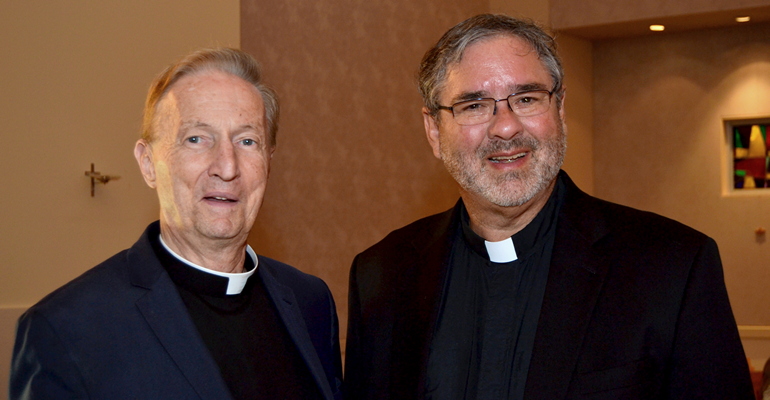By Jim Davis - Florida Catholic

Photographer: Jim Davis
Two ecumenists chat after a dialogue for Reformation 500 earlier this year at St. Thomas University. From left are Father Pat O'Neill of the Archdiocese of Miami, and the Rev. Walter Still of the Evangelical Lutheran Church in America.
MIAMI | Those who attended the Reformation 500 prayer service at St. Mary Cathedral on Oct. 29 were clearly meant to carry the message out the doors. In the back of the 13-page book of liturgy were the Five Ecumenical Imperatives drawn up by top Catholic and Lutheran officials, each with a paragraph of explanation.
Also in the book was the seven-paragraph statement by Pope Francis and the Lutheran World Federation in Lund, Sweden, at the start of the year-long observances in October 2016.
But what now? How to build on the momentum? Local Catholic and Lutheran leaders have an answer: Going local. Partnering with neighboring churches. Building on friendships.
"The relationships are more important than projects or footprints," said Father Pat O'Neill, the ecumenical officer for the Archdiocese of Miami. "I have eight to 10 new buddies this year. We've sat down to lunches and dinners, and we've stood in each other's pulpits."
Father O'Neill said he plans to begin visiting "something of the more hearty parishes" and Lutheran churches. He'll collect their ideas for growing interchurch friendship.
"Some parishes are ready for this," he said. "I want to hear from them."
The Rev. Walter Still, Florida's Lutheran specialist for Reformation 500, already has some ideas. They include joint prayer meetings, Bible studies and vespers services.
"I think we're already serving together, in things like food banks, along with Methodists Episcopalians and Presbyterians," said Rev. Still, of the Florida-Bahamas Synod for the Evangelical Lutheran Church in America. "How can we invite that into our churches?"
The calendar will have no lack of reminders, he noted: The 500th anniversaries of several more Reformation events are approaching.
The year 2021 will mark that milestone for the Diet of Worms, the assembly that ended with the condemnation of Martin Luther and his teachings.
In 2030, attention will turn to the anniversary of the Augsburg Confession, the statement of faith that attempted to defend Lutherans against Catholic charges of heresy.
Next up, in 2045, will be the Council of Trent, the Catholic response to the Reformation. And the following year will mark the 500th anniversary of Luther's death.
"So we'll have a lot of opportunities to remember the events and see what to do together," Rev. Still said. "I'm optimistic because Christ has gone ahead of us to prepare the way. I'm confident that he is leading us into the future."
Father O'Neill agreed, highlighting the hurdles that both sides have already overcome.
"Nobody celebrated the 400th and 450th anniversaries of the Reformation -- they probably didn’t even make a phone call," he said. "We talked against each other 50 years ago, until Vatican II opened the door. But what made it fly, what made a difference, was good people on both sides.
"This is not a celebration -- it's a commemoration of how far we've come. And to say to ourselves that there is no turning back. We've got to go ahead, and grow at the local level."
Also see: Archbishop and Lutheran bishop embrace at Reformation 500 service at St. Mary's.

